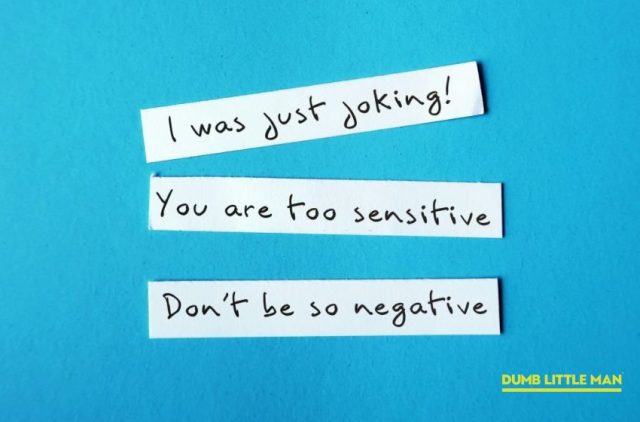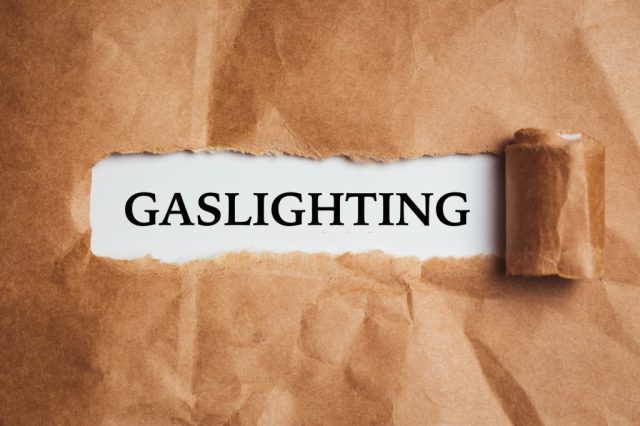Subtle Signs of Gaslighting and How to Spot Them
By John V
January 10, 2024 • Fact checked by Dumb Little Man

When was the last time you doubted your memory, your perception, or your understanding of reality? Have you ever experienced someone dismissing your concerns, making fun of your feelings, or casting doubt on your self-worth? These are just a few of the numerous signs that someone has been tricked.
Gaslighting is a deceptive kind of interpersonal manipulation, and it can have terrible psychological and emotional effects. The capacity to spot the early warning signs of gaslighting is essential to one’s sense of self and ability to sustain good, stable relationships. This article will define gaslighting, explain why it frequently occurs in romantic partnerships, and show readers how to spot its early warning signals and react appropriately.
Understanding Gaslighting

The psychological manipulation is known as “gaslighting,” made famous by the play and later movie “Gas Light,” which involves progressively eroding the reality that another person perceives. A series of incidents that make the victim doubt their own memory, perspective, and sanity are what define it.
Subtle gaslighting can take many different forms, making detection difficult. This group includes behaviors like ignoring or discounting what has already been said or done, as well as verbal expressions like sarcasm and disdain. Gaslighters can assert dominance and seize control in a relationship by changing a person’s perception of reality.
The victim of gaslighting may experience detrimental effects on their mental and emotional well-being. Anxiety, melancholy, low self-esteem, and mistaken perception of reality can result from persistent ambiguity, perplexity, and eroding self-confidence. It’s crucial to identify subtle gaslighting and react to it in order to stop future harm and preserve a positive sense of self.
RECOMMENDED DATING SITE | REVIEW | VISIT |
|---|---|---|
 | Top dating site with over 16 million active members. Free to Try! |  |
Subtle Signs of Gaslighting

Gaslighting is a deceptive method that acts in subtle ways, making it difficult to detect. Understanding the subtle signs of gaslighting is critical for detecting the behavior and taking corrective action. Here are some other explanations for the subtle indicators of gaslighting:
Discrediting Your Memory
Discrediting someone’s memory is one of the most common subtle signs of gaslighting that gaslighters usually employ. Gaslighters are skilled in discrediting your memory of events, leading you to mistrust your recollection and your own sanity. They may say with confidence that something did not occur as you recall, leaving you perplexed and uncertain. This repeated undermining of your memory erodes your self-confidence over time, making you more reliant on the gaslighter’s version of events.
Denying Their Own Actions
Even when confronted with facts, gaslighters frequently deny saying or doing things. They may fully deny any responsibility for their actions or comments, leading you to question your own vision of reality. This denial of their behavior is a deceptive approach designed to transfer blame and make you doubt your own judgment.
Using Sarcasm or Mockery
Sarcasm or mocking are frequently used by gaslighters to belittle your feelings, opinions, or concerns. To make you feel small and insignificant, they may employ dismissive remarks, dismissive tones, or mocking gestures. This strategy is designed to undermine your self-esteem and make you question the validity of your emotions and viewpoints.
Trivializing Your Concerns
Gaslighters frequently downplay your legitimate problems, making you feel as if your feelings are overblown or insignificant. They may downplay the importance of your concerns or reject them as insignificant. This dismissive approach invalidates your experiences and feelings, leading you to doubt the validity of your problems and decreasing your self-worth even further. If ignored, this type of emotional abuse can worsen your emotional health.
Shifting Blame
Gaslighters typically blame you for their mistakes, flaws, or inappropriate behavior. They refuse to accept responsibility for their actions, instead heaping blame completely on your shoulders. This technique tricks you into feeling sorry and responsible for things that are clearly out of your control. Gaslighters maintain control and evade accountability by transferring blame.
Gaslighting Disguised as a Concern
Gaslighters may pretend to be concerned about your well-being in order to manipulate you further. They may profess to be overly concerned about you or show concern about your mental health, all while undermining your confidence and making you question your own judgment. This strategy is especially devious since it takes advantage of your vulnerability and trust to increase their power over you.
Gaslighting Through Positive Reinforcement
Intermittent positive reinforcement is frequently used in such a way by gaslighters to mislead and manipulate you. They may vary between acts of generosity, affection, and support and moments of deception. This inconsistency throws you off guard because you never know which version of the gaslighter you’ll encounter. The sporadic reinforcement increases your emotional reliance on them and makes it more difficult to detect the gaslighting strategies at work.
Also Read: Being Breadcrumbed? How To Clean Up The Crumbs In Your Dating Life
How to Spot Subtle Signs of Gaslighting

Recognizing and confronting manipulation in a relationship requires the ability to detect subtle signs of gaslighting. Here are some more explanations and tactics to help you spot gaslighting:
Paying Attention to Inconsistencies and Contradictions
Observing discrepancies and contradictions in the gaslighter’s words and actions is an excellent technique for detecting subtle signs of gaslighting. Gaslighters frequently twist or alter the truth to fit their story, resulting in contradictory reports of occurrences. Pay particular attention to any inconsistencies in their stories since these can be red signs of gaslighting behavior. Documenting instances of contradictions will assist you in spotting patterns and building a stronger case for recognizing gaslighting.
Trust Your Instincts and Emotions
When it comes to spotting gaslighting behaviors, your instincts, and emotions are invaluable guides. Gaslighters aim to make you mistrust your own intuition and feelings, yet you may have a nagging feeling that something is wrong. Believe in yourself and validate your own emotions. If you frequently feel confused, nervous, or invalidated in your relationship, this could be one of the subtle signs of gaslighting.
Seek Support and Validation
Gaslighters frequently attempt to isolate their victims, making it more difficult for them to identify the deception. Seek help and affirmation from trusted friends, family members, or professionals who can provide an objective viewpoint. Share your experiences with someone you trust and solicit comments from them. They can offer insights, reassurance, and affirmation, assisting you in gaining clarity and regaining faith in your own reality.
Educate Yourself
Educating yourself on gaslighting and its strategies will help you recognize subtle signs of gaslighting. Learn about the many strategies used by gaslighters, such as manipulation, invalidation, blame-shifting, and factual distortion. Understanding the dynamics of gaslighting will help you recognize when these tactics are being used in your relationship. Books, articles, and respected online sites can all provide useful knowledge and direction.
Recognize the Pattern of Gradual Manipulation
Gaslighting often begins gently and steadily worsens over time. You might become more aware of the gaslighter’s tactics by recognizing the pattern of manipulation. Take note of the sequence of events and how your view of reality has changed. Gaslighters may begin by making little comments or eroding your confidence before progressing to more serious manipulations. Recognizing this pattern can assist you in breaking away from the gaslighter’s grip.
Practice Self-Care and Self-Reflection
Participating in self-care activities and practicing self-reflection can help you identify subtle signs of gaslighting. Allow yourself time to reflect on your thoughts, feelings, and experiences. Journaling, meditation, counseling, or indulging in hobbies that you enjoy can assist you in reconnecting with your inner voice and increasing self-awareness. When you emphasize self-care, you improve your emotional resilience and become more sensitive to attempts at gaslighting.
Trustworthy Outside Perspectives
If you find yourself questioning your reality or continuously feeling invalidated, seek advice from trusted outside sources such as therapists, counselors, or support groups. They can provide objective insights and assist you in assessing the problem. Their professional skills and experience with gaslighting dynamics can assist you in more effectively recognizing and navigating the manipulation.
RECOMMENDED DATING SITE | REVIEW | VISIT |
|---|---|---|
 | Top dating site with over 16 million active members. Free to Try! |  |
Addressing Gaslighting in Relationships

When you suspect gaslighting in your relationship, you must move quickly to preserve your well-being. Here are some techniques for dealing with gaslighting:
Set Boundaries and Express Concerns
Set firm boundaries and speak firmly with the gaslighter. Express your concerns calmly and let them know that their behavior is unacceptable. Maintain your feeling of self by being firm in proclaiming your truth.
Seek Therapy or Counseling
Seek professional assistance, either as a couple or individually, to help you manage the complexity of gaslighting in your relationship. Therapists can offer advice, support, and resources to help with effective communication and healing.
Evaluate the Relationship
Examine the relationship’s overall health and whether the gaslighting conduct is ongoing and harmful. If the gaslighting persists despite efforts to address it, it may be vital to reconsider the relationship’s future.
Build a Support Network
Contact trusted friends, family, or support groups for emotional support and understanding. Creating a support network will assist you in regaining your confidence and providing a secure environment for healing.
Conclusion

In conclusion, gaslighting is a manipulative technique that can do severe harm to people in relationships. Recognizing the subtle indicators of gaslighting is critical to preserving your mental and emotional well-being. You can break free from the damaging consequences of gaslighting by knowing it, recognizing its behaviors, and taking proper action. Remember to put your mental well-being first, seek help when you need it, and surround yourself with a support network. You may reclaim your truth and create healthier, more rewarding relationships by doing so.
FAQs: Subtle Indicators of Gaslighting
How can I differentiate between normal relationship disagreements and gaslighting?
Couples frequently dispute and have opposing points of view. Gaslighting, on the other hand, goes beyond constructive conflict resolution, involving deceptive strategies aimed at distorting your reality, invalidating your experiences, and eroding your self-confidence. If you continually doubt your own sanity, feel rejected or belittled, and detect a pattern of frequent undermining and manipulation, this could be a sign of gaslighting rather than usual relationship problems.
I sometimes doubt my own memory and perception. Does that mean I’m being gaslit?
Gaslighting can cause you to doubt your recollection or perception, as gaslighters specialize in making you question your reality. However, other considerations must also be considered. Stress, tiredness, and other outside circumstances can all have an effect on your memory and perception. If you find yourself frequently doubting your experiences, especially if there is a pattern of manipulation, invalidation, and control, it may be worth investigating the possibilities of gaslighting in your relationship.
Can gaslighting occur in friendships or family relationships, or is it specific to romantic partnerships?
Gaslighting can occur in a variety of situations, not simply sexual ones, such as friendships and family interactions. Regardless of the relational situation, manipulative people can use gaslighting tactics to acquire power and influence over others. It’s critical to recognize the indications of gaslighting in all sorts of relationships and to take action to address and defend your well-being if you notice these actions.
What should I do if I suspect gaslighting in my relationship but I’m afraid of confronting the gaslighter?
Confronting a gaslighter can be difficult and potentially dangerous, particularly if there is a power imbalance or fear of vengeance. If you are terrified or feel unsafe, it is critical that you prioritize your well-being and seek help from trusted friends, family, or professionals. They can offer advice, a safe location to express your concerns and assistance in exploring solutions for dealing with the gaslighting behavior. Remember, you are not alone, and there are tools available to assist you in navigating this difficult situation.
John V
John is a digital marketing master's student who enjoys writing articles on business, finance, health, and relationships in his free time. His diverse interests and ability to convey complex ideas in a clear, engaging manner make him a valuable contributor to these fields.




